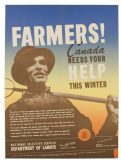Canada today will release a list of U.S. products that will be subject to retaliatory tariffs if the Americans do not modify their mandatory country of origin labelling requirements.
In a morning news conference from Vancouver, federal agriculture minister Gerry Ritz said the list of items is comprehensive. Its release is a pressure tactic designed to encourage changes to mandatory COOL legislation that has cost the Canadian beef and pork industries an estimated $1 billion per year since it was implemented in late 2008.
The list must be presented to the World Trade Organization for approval before retaliatory tariffs can be implemented, a process that could take 12 to 18 months.
Read Also

Women who fed a nation
More than 40,000 young women supported the war effort between the 1940s and early 1950s, helping grow and harvest crops amid labour shortages. They were called Farmerettes.
However, Ritz said he hopes the U.S. will take quicker steps to amend COOL to be WTO compliant long before then. Items on the list were chosen to get the attention of U.S. Senate and congressional agriculture committees, said Ritz.
Complete list of U.S. products that will be subject to retaliatory tariffs
He called COOL “a misdirected policy that continues to inflict significant economic damage on Canada’s agriculture industry, particularly our livestock sectors.
“COOL is an unnecessary trade barrier that harms livestock producers on both sides of the border by greatly increasing our producers’ cost of doing business.”
The WTO ruled last year that COOL violated trade agreements. The U.S. amended the rules in May but those revisions were widely considered to be worse than the original, and more costly to Canadian meat and livestock trade.
Canadian Cattlemen’s Association vice-president Dave Solverson said the new version of COOL could cost producers $100 per head, as opposed to the $40 per head in losses incurred from the first version of the legislation.
Canadian Pork Council past-chair Jurgen Preugschas said his industry has seen a 15 percent drop in exports of live hogs to the U.S. since the U.S. announced its COOL amendments in May.
Ritz said Mexico, which joined Canada in its original WTO objections to COOL, is preparing its own list of items that will also be subject to retaliatory tariffs if the matter goes that far.
“This situation could have been avoided if the U.S. had complied with the WTO decision, and still can be,” said Ritz.
“Today we renew our call on the U.S. to abide by the letter and spirit of the WTO ruling.”
The federal government’s action in preparing the list was greeted with approval by various Canadian livestock producer groups and by the Canadian Meat Council.
Solverson, of the CCA, said the latest step in COOL resolution was unfortunate “but somebody has to ensure that the U.S., as a WTO member, lives up to its trade obligations.”
Added Preugschas, “We think this is absolutely critical, that we do this,” he said, adding COOL legislation must be changed.
“We believe that that is the only way in which the U.S. can come into WTO compliance. Certainly retaliation is not preferred.”
Ritz said he has discussed COOL with U.S. agriculture secretary Tom Vilsack.
Typical of the minister, he joked that Vilsack, as a fan of the Pittsburgh Penguins, might be interested if Canada implemented COOL rules on Canadian-born Penguin players Sidney Crosby and Jarome Iginla.















